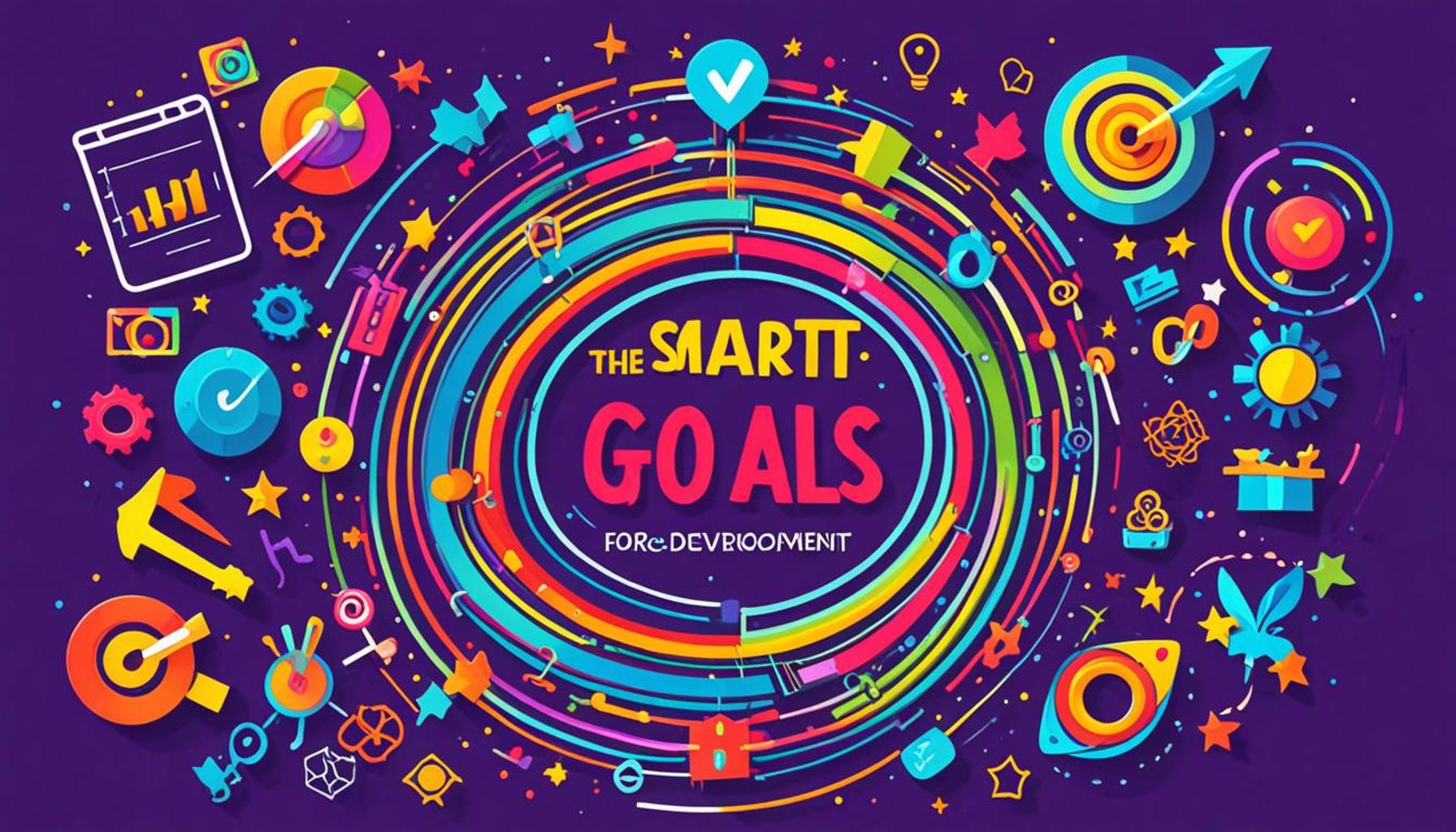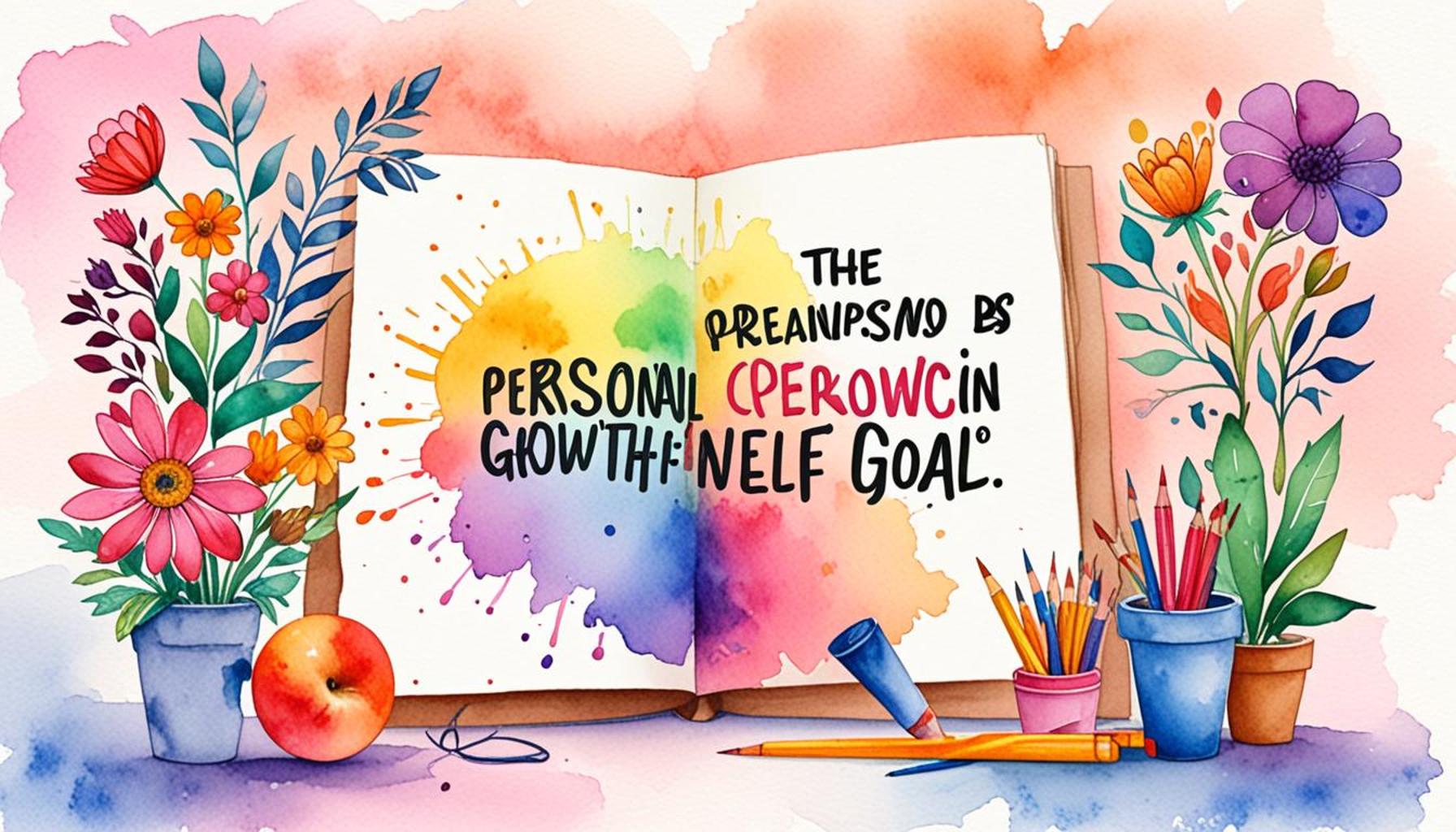The Importance of Setting SMART Goals for Personal Development

What are SMART Goals?
Setting goals is an essential aspect of personal development, but not just any goals will do. Objectives need to be SMART: Specific, Measurable, Achievable, Relevant, and Time-bound. This structured approach allows individuals to target their aspirations with precision, increasing the likelihood of success. The concept of SMART goals emerged in the 1980s, and has since been embraced by educators, business professionals, and personal development coaches alike.
Benefits of Implementing SMART Goals
Why should you consider using SMART goals in your personal and professional life? Here are some compelling reasons:
- Clarity: Clearly defined goals eliminate confusion and provide a clear direction. For example, stating “I want to improve my writing” lacks specificity, while saying “I will write for 30 minutes every day” makes it actionable.
- Motivation: Having measurable accomplishments gives you a sense of achievement, which can boost your morale. For instance, tracking your progress towards a target of saving N100,000 over six months can highlight your growth and motivate you to keep pushing forward.
- Focus: Keeping your goals relevant to your personal interests and priorities ensures you remain engaged. For a student aiming to enter the tech field, focusing on learning programming languages instead of unrelated subjects can save time and energy.
The Importance of Goal-Setting in Nigeria
In Nigeria, where the pursuit of education and career advancement is competitive, the need for effective goal-setting becomes even more critical. The job market is saturated, and many young professionals are faced with the challenges of job hunting, skill acquisition, and entrepreneurial ventures. This is where SMART goals come into play; they provide a concrete framework that helps navigate these challenges.
Imagining Your Roadmap
Imagine constructing a detailed roadmap for your life built upon SMART goals. This roadmap can include:
- Completing a degree within a specific timeframe, such as finishing a university program in four years while maintaining a CGPA of 3.5 and above.
- Learning a new skill that enhances your employability, like mastering digital marketing over the next six months through online courses and real-world projects.
- Saving a certain amount for investment in a business venture, where you plan to save N50,000 every month over the course of the year to fund a small tech startup.
Taking Steps Toward Personal Growth
Understanding how to set SMART goals will not only aid in personal growth but also empower you to take meaningful steps toward your future. Whether you are a student looking to enter the workforce or a young professional honing your craft, these easily digestible frameworks can significantly enhance your chances of success. Delving deeper into this topic could be your first move toward effective self-improvement.

CHECK OUT: Click here to explore more
Enhancing Personal Development Through SMART Goals
Setting SMART goals is more than just a productivity hack; it’s a fundamental strategy that aids in personal development by creating a clear path forward. Individuals, particularly in Nigeria where competition is fierce, can significantly benefit from defining their aspirations through the SMART framework. Each element—Specific, Measurable, Achievable, Relevant, and Time-bound—not only lays the groundwork for realistic objectives but also integrates seamlessly into one’s daily life.
Specific: Defining Your Path
To achieve success, your goals must be specific. A vague goal is akin to a ship without a rudder; it lacks direction. For instance, instead of saying, “I want to learn software development,” which may lead to confusion or inaction, a specific goal would be, “I will enroll in a software development course and complete it within six months.” This specificity empowers you to take concrete actions that align with your overall vision.
Measurable: Tracking Your Progress
Measurability allows you to assess your advancements and stay motivated. Breaking down a long-term goal into smaller, measurable milestones can transform the daunting journey into manageable steps. For example, if your aim is to start a small business, setting quarterly targets—such as saving N10,000 every month—provides tangible benchmarks to track your financial readiness. This clarity not only encourages momentum but also allows for adjustments along the way, ensuring you remain on track.
Achievable: Setting Realistic Goals
The ‘Achievable’ aspect of SMART emphasizes the importance of setting goals that are realistic given your current resources and constraints. For instance, a student aspiring to graduate with honors should account for their study habits and time management skills. Instead of overwhelming oneself with the goal of attending every lecture and reading every textbook, a more achievable plan might involve committing to attending 80% of classes and reading key chapters each week. This signature of attainable aspirations fosters confidence and dedication.
Relevant: Aligning With Personal Values
Next, your goals must be relevant to your life situation and align with your ambitions. In a diverse country like Nigeria, where personal circumstances can vary widely, ensuring that your goals resonate with your aspirations is crucial. If your passion lies in environmental conservation, setting a relevant goal such as volunteering with local NGOs or initiating a community cleanup project can make the pursuit more engaging and fulfilling.
Time-bound: Creating a Sense of Urgency
Finally, incorporating a time frame provides urgency that propels you toward your goals. Setting deadlines, whether short-term or long-term, creates a sense of accountability. For instance, aiming to complete a professional certification within six months establishes a timeframe that keeps you dedicated to the task. Without a deadline, priorities can often blur, and ambition can stagnate.
By effectively applying the SMART framework in setting your goals, you position yourself for meaningful achievements in personal development. This not only paves the way for individual growth but also nurtures resilience and adaptability, traits that are essential in life’s unpredictable landscape. Embracing this systematic approach could be the key to unlocking your potential and navigating the complexities of personal and professional growth in today’s world.
| Advantage | Description |
|---|---|
| Enhanced Focus | SMART goals provide clarity, directing attention towards specific outcomes rather than vague aspirations. This focus can enhance productivity and efficacy in personal development endeavors. |
| Measurable Progress | By incorporating quantifiable metrics, SMART goals allow individuals to track their progress, which fosters a sense of achievement and motivation. This continuous feedback is essential for sustained personal development. |
Incorporating SMART goals into your personal development journey is not just a theoretical exercise; it is a practical approach that can yield significant benefits. The enhanced focus derived from these goals helps individuals cut through distractions and prioritize their efforts. Furthermore, the measurable aspects mean that you are not just relying on self-perception; you can refer to tangible indicators of your growth. As you craft your SMART goals, consider how they will guide your actions and reflect your progress along the way, ultimately leading to more fulfilling personal development experiences.
CHECK OUT: Click here to explore more
Transforming Aspirations into Achievable Outcomes
As the pursuit of personal development becomes increasingly critical in today’s dynamic landscape, the implementation of the SMART goal framework serves as a catalyst for substantial change. Understanding how these principles can be applied practically is crucial, especially in a socio-economic context like Nigeria, where the drive towards self-improvement is often met with numerous challenges. In this segment, we will explore how cultivating a growth mindset, leveraging support networks, and employing reflection techniques can enhance the effectiveness of SMART goals.
Cultivating a Growth Mindset
A transformative element in personal development is adopting a growth mindset, a concept popularized by psychologist Carol Dweck. This mindset encourages individuals to view challenges as opportunities for learning rather than obstacles. For instance, when faced with the complexities of mastering a new skill, such as digital marketing, rather than feeling disheartened by initial failures, individuals who embody a growth mindset view these experiences as stepping stones. This perspective dovetails beautifully with the SMART framework, enabling individuals to set specific goals that push their limits while remaining flexible in their approach to achieve them.
Leveraging Support Networks
Another pivotal factor in achieving personal goals is the recognition of the importance of social connections. In Nigeria, where community ties are often strong, leveraging a support network can provide motivation and accountability. Engaging with peers, mentors, or family in goal-setting conversations expands the scope of your aspirations. For example, if your goal is to enhance your public speaking skills, consider joining a local Toastmasters club. Within such networks, members can offer feedback, celebrate achievements, and provide resources, ensuring that individuals are not navigating their journeys in isolation.
Employing Reflection Techniques
Reflection is an essential practice that complements the SMART goal structure. Regularly assessing progress not only keeps you accountable but also informs any necessary adjustments. Techniques such as journaling or monthly reviews of your goals can shed light on what is working well and what may require a change of strategy. For example, suppose a person following the SMART principle aims to complete a personal development book each month. In reflecting after several months, they may realize that this goal needs modification due to unexpected life events and commitments. Instead, a revised goal could be to read for 15 minutes daily, which is more manageable and consistent with their current lifestyle.
Integrating Technology for Progress Tracking
In today’s digital age, technology plays a pivotal role in personal development. There are numerous applications and online platforms offering tools for tracking progress on SMART goals, helping individuals stay motivated and organized. Apps like Trello or Notion allow users to visualize their tasks while offering reminders that facilitate ongoing engagement with their objectives. In Nigeria, where mobile connectivity is rapidly improving, harnessing such technology can enhance goal achievement and align daily actions with one’s long-term vision.
Incorporating these strategies into the SMART goal framework not only enhances personal development but also fosters a deeper commitment to continuous growth. By actively engaging with a supportive community, cultivating a resilient mindset, reflecting on progress, and utilizing technological tools, individuals can maximize their potential and navigate the complexities of life with greater ease.
LEARN MORE: This related article may interest you
Conclusion: The Power of SMART Goals in Personal Development
In conclusion, the importance of setting SMART goals for personal development cannot be overstated. By specifically defining your goals, ensuring they are measurable, achievable, relevant, and time-bound, you create a clear roadmap that transforms aspirations into tangible results. This structured approach not only enhances focus and determination but also instills a sense of accountability essential for sustainable growth.
Moreover, as highlighted throughout this article, cultivating a growth mindset, leveraging supportive social networks, and employing consistent reflection techniques are vital elements that amplify the efficacy of SMART goals. These strategies not only assist individuals in overcoming obstacles but also empower them to recognize opportunities for learning and improvement. Especially in a diverse social landscape like Nigeria, where local communities can play a pivotal role in motivation, tapping into these resources can lead to remarkable personal advancements.
Furthermore, in the age of technology, integrating tools that aid goal tracking and progress evaluation can provide a significant advantage. By embracing digital solutions, individuals can stay organized and motivated, ensuring their pursuits align with their long-term aspirations.
Ultimately, the journey of personal development is a continuous one, and SMART goals are the compass guiding individuals towards their desired destinations. By committing to these principles, you not only invest in your personal growth but also set a powerful example for those around you, encouraging a culture of self-improvement and resilience. As you embark on this transformative journey, remember that each goal achieved is not merely an endpoint but a stepping stone to even greater possibilities.



